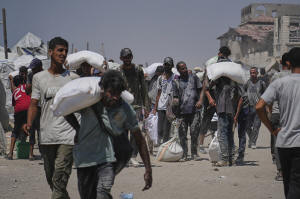Israel begins daily pause in fighting in 3 Gaza areas to allow 'minimal'
aid as hunger grows
[July 28, 2025]
By WAFAA SHURAFA, TIA GOLDENBERG and SAMY MAGDY
DEIR AL-BALAH, Gaza Strip (AP) — The Israeli military Sunday began
limited pauses in fighting in three populated areas of Gaza for 10 hours
a day, part of measures including airdrops as concerns grow over surging
hunger and as Israel faces criticism over its conduct in the 21-month
war.
The military said the “tactical pause” from 10 a.m. to 8 p.m. in Gaza
City, Deir al-Balah and Muwasi, all with large populations, would
increase humanitarian aid entering the territory.
United Nations humanitarian chief Tom Fletcher welcomed Israel's
decision to support a “one-week scale-up of aid" and said “some movement
restrictions appear to have been eased." But he said action needs to be
sustained, vast and fast.
“Whichever path we choose, we will have to continue to allow the entry
of minimal humanitarian supplies," Israeli Prime Minister Benjamin
Netanyahu said.
Images of emaciated children have fanned criticism of Israel, including
by allies who call for the war's end. Israel has restricted aid to
Gaza's population of over 2 million because it says Hamas siphons it off
to bolster its rule, without providing evidence. Much of the population,
squeezed into ever-smaller patches of land, now relies on aid.
As the military had warned, combat operations continued otherwise.
Health officials in Gaza said Israeli strikes killed at least 41
Palestinians from late Saturday into Sunday, including 26 seeking aid.
Aid for some, none for others
“I came to get flour for my children because they have not tasted flour
for more than a week, and thank God, God provided me with a kilo of rice
with difficulty,” said Sabreen Hassona, as other Palestinians trudged
along a dusty road carrying sacks of food from the Zikim crossing.

But aid came slowly for others, if at all. “We saw the planes, but we
didn't see what they dropped,” Samira Yahya said in Zawaida in central
Gaza. “They said trucks would pass, but we didn't see the trucks.”
Some people feared going out and having a box of aid fall on their
children, Ahmed al-Sumairi said.
‘Every delay is measured by another funeral’
Israel's military said 28 aid packages containing food were airdropped,
and said it would put in place secure routes for aid delivery. It said
the steps were made in coordination with the U.N. and other humanitarian
groups.
The U.N. World Food Program said it had enough food in, or on its way,
to feed all of Gaza for nearly three months. It has said nearly half a
million people were enduring famine-like conditions.
Antoine Renard, WFP’s country director for the occupied Palestinian
territories, said around 80 WFP trucks entered Gaza, while another over
130 trucks arrived via Jordan, Ashdod and Egypt. He said other aid was
moving through the Kerem Shalom and Zikim crossings.
He stressed it was not enough to counter the “current starvation.”
Gaza saw 63 malnutrition-related deaths in July, including 24 children
underage 5, the World Health Organization said.
Dr. Muneer al-Boursh, Gaza Health Ministry's director-general, called
for a flood of medical supplies to treat child malnutrition.
“This (humanitarian) truce will mean nothing if it doesn’t turn into a
real opportunity to save lives,” he said. “Every delay is measured by
another funeral.”
Questions over ceasefire talks
Ceasefire efforts appeared to be in doubt. Israel and the U.S. recalled
negotiating teams from Qatar on Thursday, blaming Hamas, and Israel said
it was considering “alternative options” to talks.
Israel says it is prepared to end the war if Hamas surrenders, disarms
and goes into exile, something the group has refused. Khalil al-Hayya,
head of Hamas’ negotiating delegation, said the group had displayed
“maximum flexibility.”
[to top of second column]
|

Palestinians carry sacks of flour unloaded from a humanitarian aid
convoy that reached Gaza City from the northern Gaza Strip, Sunday,
July 27, 2025. (AP Photo/Abdel Kareem Hana)

Senior Hamas official Mahmoud Merdawi said Israel's change of
approach on the humanitarian crisis amounted to an acknowledgment of
Palestinians starving in Gaza, and asserted that it was meant to
improve Israel's international standing and not save lives.
Troubles with aid delivery
After ending the latest ceasefire in March, Israel cut off the entry
of food, medicine, fuel and other supplies to Gaza for 2 ˝ months,
saying it aimed to pressure Hamas to release hostages. Fifty of them
remain in Gaza, over half of them believed to be dead.
Under international pressure, Israel slightly eased the blockade in
May. Since then, the average of 69 trucks a day has been far below
the 500 to 600 trucks the U.N. says are needed. The U.N. says it has
been unable to distribute much aid because hungry crowds and gangs
take most of it from trucks.
In an attempt to divert aid delivery from U.N. control, Israel has
backed the U.S.-registered Gaza Humanitarian Foundation, which in
May opened four distribution centers. More than 1,000 Palestinians
have been killed by Israeli forces since May while trying to get
food, mostly near those sites, the U.N. human rights office says.
Israel asserts the U.N. system allows Hamas to steal aid. The U.N.
denies it.
“Gaza is not a remote island. The infrastructure and resources exist
to prevent starvation; we just need safe, sustained access,” Mercy
Corps’ vice president of global policy and advocacy, Kate Phillips-Barrasso,
said in a statement.
Killed while seeking aid
Awda Hospital in Nuseirat said Israeli forces killed at least 13
people, including four children and a woman, and wounded 101 as they
headed toward a GHF aid distribution site in central Gaza.
Israel’s military said it fired warning shots to prevent a
“gathering of suspects” from approaching, hundreds of meters from
the site before opening hours. GHF said there were no incidents at
or near its sites.
Thirteen others were killed seeking aid elsewhere, including
northwestern Gaza City, where over 50 people were wounded, and near
the Zikim crossing where over 90 were wounded, hospital officials
and medics said.
Israel's military said two soldiers were killed in Gaza, bringing
the total to 898 since the Oct. 7, 2023, Hamas attack that sparked
the war. Hamas killed 1,200 people, mostly civilians, in that
attack, and took 251 hostages.

Israel's retaliatory offensive has killed more than 59,700
Palestinians, according to Gaza’s Health Ministry. Its count doesn’t
distinguish between militants and civilians, but the ministry says
over half of the dead are women and children. The ministry operates
under the Hamas government. The U.N. and other international
organizations see it as the most reliable source of data on
casualties.
U.S. President Donald Trump on Sunday called the images of emaciated
and malnourished children in Gaza “terrible."
___
Goldenberg reported from Tel Aviv, Israel, and Magdy from Cairo.
Associated Press writer Seung Min Kim in Cincinnati, Ohio,
contributed.
All contents © copyright 2025 Associated Press. All rights reserved |